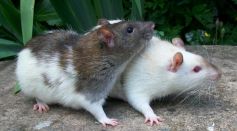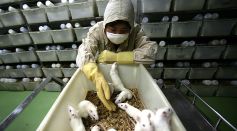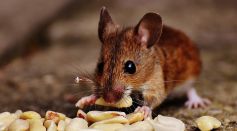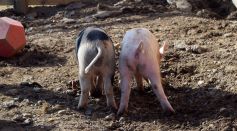Tags: Mice

Anti-Aging Supplement Tested in Mice Can Prolong Human Life, Study Suggests

How Does Our Brain Work, Learn Skillful Movements? Researchers Show the Way Through Lab Rats’ ‘Little Dance’

Chemical Messenger Dopamine Moves Mice Into 'Dreamy Stage' of Sleep, What Does It Mean for Human's Behavior?

Frog, Mice and Beetles Ride on a Snake's Back to Survive Flood After a Heavy Rainfall in Queensland

COVID-19 Omicron Variant May Have Evolved in Mice, Instead of Humans

Link Between Obesity and Periodontal Disease Found; Research Shows How Inflammation May Trigger a Cell Breakdown
Spatial Learning Impairment Observed from Deep Space Radiation-Exposed Mice, Affects Male Subjects Than Female

Japanese Sperm Delivery: Freeze-Dried Mouse Sperm Sent via Mailing Postcard Best for Fertility Hypothesis, Biological Research
Magnetic Helmet Developed to Shrink Aggressive Brain Tumor; 1st Time to Test on 53-Year-Old Patient

Dopamine Impulses Can Be Controlled in the Brain of Mice in Anticipation of Rewards
How Do Mice See the World? Scientists Developed Open-Source Camera to Capture Habitats as Rodents See It
Gut Microbiome Could Influence Social Behavior in Some Animals, Study Suggests

Neuronal Activity Observed in Mice, Normal Routine Results to Brain Tumor

Mammals Breathe Through Intestines to Recover From Respiratory Distress; Can Humans Do The Same?

Ebola Virus Vaccine: New Nanoparticle-Based Shot Show Promising Results in Rabbits, Mice

Inhaled Vaccines Show Effectiveness in Strengthening Immune Response in Mice, Primates

Your Nose Could Help You Get Fitter, Study in Mice Finds

Materialist Neurologist: 'The Mind is Simply What the Brain is Doing’
Can A Rat Tell When A Movie Features Rats?
Common Food Additive Found in Desserts and Drinks Produce Adverse Colon Inflammation: Study
Most Popular

Space Tourism Future: How Commercial Space Travel Will Transform Civilian Exploration

Universe Origin Revealed: Exploring the Latest Big Bang Science Theories and Discoveries

How Space Observation and the Solar Light Spectrum Make the Sun Look Different in Space Than on Earth

Tree Communication Explained: How Underground Fungi Networks Connect Entire Forests





